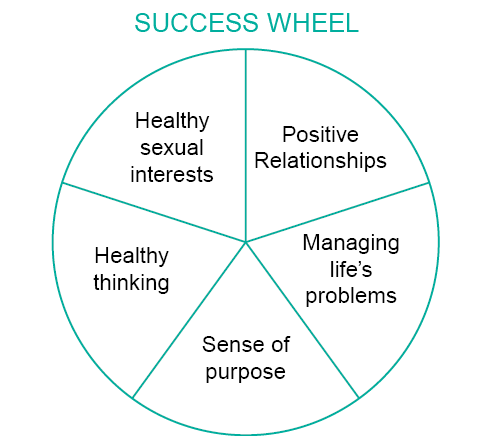Accredited programmes
Accredited Programmes are supported and informed by an evidence base and have evaluation processes embedded in their design. They are accredited by the Correctional Service Accreditation and Advice Panel (CSAAP), an international panel of subject matter experts who review each programmes’ evidence base, design, content and delivery against a rigorous set of criteria.
These programmes are only delivered by trained facilitators, primarily within a group setting for up to 12 participants. Consideration can be given to delivery on a one-to-one basis in exceptional circumstances. With the introduction of the Alternative Delivery Formats (ADF) approach as part of COVID-19 Recovery, variation to delivery in exceptional cases will be available, where required, to meet participant needs.
Programme requirements are available as a sentence of the Court under the Criminal Justice Act 2003 and fall under the statutory purposes of sentencing of reform and rehabilitation of offenders and the protection of the public. They can also be added as Licence conditions to all types of prison Licences and Post Sentence Supervision. Probation Practitioners will identify all eligible and suitable cases at the pre-sentence or pre-release stage and will propose an Accredited Programme (when there are no barriers to attendance).
HMPPS offers a suite of Accredited Programmes which attend to a range of offending-related needs of participants. Each programme has suitability criteria that is used alongside the initial risk assessment to see if an individual is in scope for a programme. This will vary slightly between programmes but will consider aspects such as the individual’s need areas and responsiveness to intervention, as well as ensuring their consent and willingness/commitment to engage in an Accredited Programme.
Delivery of Accredited Programmes is flexible, based on regional need. All regions will deliver, as a minimum:
- Thinking Skills Programme (TSP)
- Building Better Relationships (BBR)
- Sexual Offending Programmes
Click on each tab below to see the full details for each programme available in your region.
Building Better Relationships (BBR)
 BBR is for adult male perpetrators convicted of an Intimate Partner Violence (IPV) related offence against a female partner, who present with a moderate or high risk of committing future IPV offences.
BBR is for adult male perpetrators convicted of an Intimate Partner Violence (IPV) related offence against a female partner, who present with a moderate or high risk of committing future IPV offences.
BBR has a strong skills focus and participants are provided with a range of cognitive and behavioural skills and tools to support and promote the use of positive behaviours in their intimate relationships. BBR makes use of a range of treatment approaches and techniques.
BBR is a moderate intensity cognitive-behavioural group work intervention. Its theory base reflects the growing view that IPV is a complex problem that is likely to have multiple causes. BBR is responsive to the needs of individual participants and provides opportunities to develop skills that are introduced during the programme.
Probation staff are expected to refer all individuals who meet the eligibility and suitability criteria to BBR in community sites.
Individual Requirements
Gender: Male
Age: 18+
- IPV related offence (this can be index or historical)
- Relationship problems
Social skills deficits:
- Attitudes that support relationship violence
- Stereotyped gender roles and inequality beliefs
- Hostile masculinity
- Aggression and anger
- Emotional mismanagement/self-regulation
- Jealousy
- Coercive control
- Obsessive and controlling behaviour towards a current or former partner in context of an intimate relationship
- Separation / threat of separation
- Alcohol and drug misuse
Delivery Method
 BBR is comprised of 24 group and 5 individual sessions.
BBR is comprised of 24 group and 5 individual sessions.
The Foundation Module is always delivered first and comprises of six 2.5-hour sessions which must always be completed prior to the other modules.
The remaining modules are delivered as either a closed group or in a rolling format, with each module comprising of six 2.5-hour groupwork sessions.
After each module participants have a one-hour one-to-one session with their designated facilitator, the purpose of which is to provide a bridge between modules, review learning and check progress against goals.
Mr. A, Graduate of Horizon

 NMS has been specifically designed to be responsive to the communication styles and abilities of people with learning disabilities and learning challenges (LDC).
NMS has been specifically designed to be responsive to the communication styles and abilities of people with learning disabilities and learning challenges (LDC).
 The Healthy Intervention Programme (HII) is a one-to-one programme that targets the social and psychological drivers of extremist offending. HII is made up of a combination of discussion, reflection, written exercises and skills practices.
The Healthy Intervention Programme (HII) is a one-to-one programme that targets the social and psychological drivers of extremist offending. HII is made up of a combination of discussion, reflection, written exercises and skills practices.